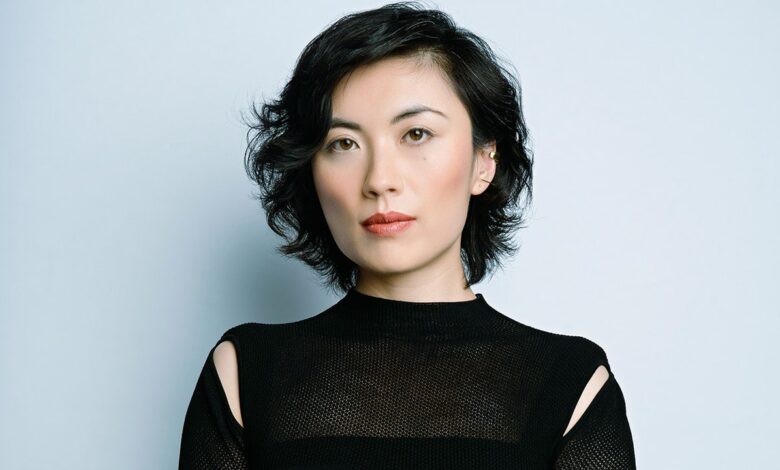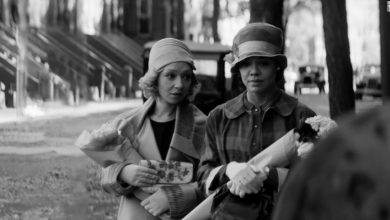C Pam Zhang on Relishing Pleasure, Observing Billionaires, and Writing a Love Story

“That year of the pandemic, and my first book coming out during the pandemic, was one of deep disconnection from a lot of the things that used to be important to me,” C Pam Zhang says over a call late one summer afternoon, “including writing, including eating, and being part of community and just being in my body. Writing this book was a way to get back to a lot of that.”
Land of Milk and Honey (Riverhead), following her Booker Prize–longlisted debut, How Much of These Hills Is Gold, which hit shelves April 2020, is a sensuous if complicated ode to hedonism. In it, a killing smog has blanketed the earth; strawberries are gone, then nuts and seeds and powdered basil. Life spans are shorter than they have been in three generations, borders are closed, and much of the world subsists on a miraculous mung-protein-soy-algal flour—entirely life-sustaining and utterly joyless.
As she watches her world crumble, a 29-year-old cook with substantial debt and a wobbly UK visa impulsively quits her restaurant job to take a position as private chef to a “research community” on a privately owned mountain on the French-Italian border, the full scale of which she will only gradually come to understand. Her role is to concoct meals delicious enough to woo a handful of potential investors. A complicated task, the chef realizes, when she finds she can no longer stomach the rich ingredients she’s been longing for.
While her billionaire employer is, at least initially, a shadowy presence—a sharky black eye peering out of a reversing car—his passionate and mercurial daughter, 20-year-old Aida, blazes into the chef’s consciousness full force, “shaggy furs above, stick legs below, with the slight stagger of a bird blown off course and stranded thousands of miles from its destination.” Her posh accent cloaks crude zingers. “He would eat a pig’s asshole if you called it calamari,” she says of her father. It’s through Aida that the chef rediscovers her palate for pleasure, but their relationship isn’t without barbs and mysteries: The chef’s mother was Chinese, her father Korean American, and, “hungry for connection,” she asks half-Asian Aida, “Your mother, what was she?” only to be rebuffed, “Who the fuck are you to pry?”
The book arrived to Zhang chronologically, beginning with a prologue in which the chef appears as an older woman revisiting a pivotal year. The first line of the prologue: “One day, after my life is already over, a girl comes up to me at the back of the auditorium and says, Are you the famous chef from Miele?” Throughout 2020, Zhang found herself largely unable to read fiction, turning instead to biographies of women artists like Georgia O’Keefe and Angela Carter. “Creatively, I became really interested in writing something that was able to look back,” she says. “I think I needed to write to remind myself that it was possible to live through what felt like an apocalypse and make meaning of it.” There was one exception to the novel rule: The Lover by Marguerite Duras, which “also starts with that framed narrative of an older woman looking back at a moment in her life, that despite the many decades that have passed, remains incredibly vital and visceral.”
“Because eating out was still deeply constrained,” Zhang says of her time writing the novel, “it was kind of an elegy, a way to experience food and the senses through the page when I couldn’t access them in my body. I think that whenever we access something that we loved, or love through a memory, there’s this extra layer of emotional intensity embedded in it because we know that it is lost.”
I’m reminded of Evelyn Waugh’s 1959 introduction to his 1945 novel Brideshead Revisited (which Zhang notes in her Acknowledgements alongside such entries as eggplant cookies eaten in Bangkok and the authors R.O. Kwon and Raven Leilani) in which he describes writing his novel during “the bleak period of present privation and threatening disaster—the period of soya beans and Basic English—and in consequence the book is infused with a kind of gluttony, for food and wine, for the splendors of the recent past…”
Here, in conversation with Vanity Fair, Zhang discusses favorite recent meals, the parallels between cooking and writing, and the dire importance of pleasure.
This interview has been edited and condensed for clarity.




